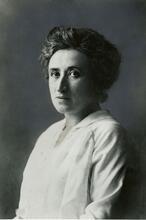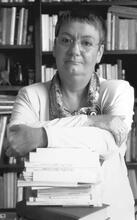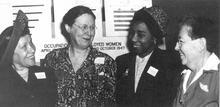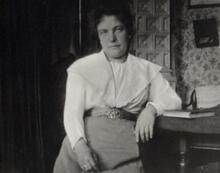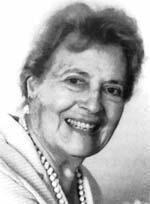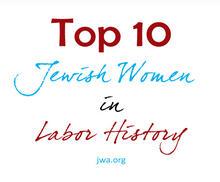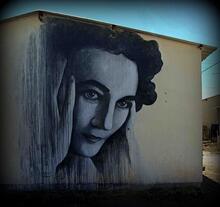Rosi Wolfstein-Fröhlich
Rosi Wolstein began her career in 1912 being taught by and then collaborating with famed socialist writer and activist Rosa Luxemburg. She then helped found the Independent Social Democratic Party in 1917 and was elected as a representative for the German Communist Party in the Prussian provincial parliament in 1921. She continued to work in socialist politics despite interparty conflicts that led to her expulsion from the Communist Party in 1929. Wolstein was a journalist during World War II but fled Europe after being arrested in Paris by the Nazis. She settled in New York and continuing her work there until after the war, when she returned to Germany and remained active in party and workplace politics until her death.
Early Career
Rosi Wolfstein was born on May 27, 1888 in Witten in the Ruhr region, to Klara (née Adler, 1851–1938) and Samuel Wolfstein (1843–1901), a businessman. She joined the Social Democratic Party (SPD) in 1908, the year in which the reactionary Prussian law of 1850 was reformed, and women were allowed to join political organizations. In 1912/1913 she received her political education at the SPD’s Party School in Berlin, where her teacher was Rosa Luxemburg. For nine years the two women were collaborators in the battle for socialism, women’s rights, worker emancipation, anti-militarism, and pacifism. So far as the police and her political opponents were concerned, Rosi Wolfstein was “a second Rosa Luxemburg.”
Rosi Wolfstein continued her education in evening classes run by the party and during the election campaign for the Reichstag in 1912 she organized thirty-five demonstrations. The final event of SPD’s election campaign was addressed by Luxemburg and Wolfstein, both of whom excelled in speaking about both foreign and domestic policy.
In 1913 Wolfstein moved to the Lower Rhine region for both professional and political reasons. In Duisberg she worked for the social-democratic Consumers’ Association; inside the party she was involved in women’s rights, young people’s rights and peace politics, becoming the spokeswoman of the party’s left wing in the Rhineland. When the social democratic faction in the Reichstag reversed its position on the “Burgfrieden” (truce), her links with the party began to loosen. During World War I she moved steadily to the left and as a radical pacifist she was several times arrested.
Political Career
Under the influence of Luxemburg, together with whom she frequently agitated for revolution in the Ruhr region until Luxemburg’s murder in 1919, she joined the Spartacist League. In April 1917 she was among the founders of the USPD (Independent Social Democratic Party). During the November revolution she became a member of the Workers’ and Soldiers’ Council in Düsseldorf. At the Second World Congress of the Comintern (July 1920) held in the USSR, she met Lenin, with whom she quarreled on the issue of using force. As one of the founders of the KPD, the German Communist Party, and a member of its central committee, she headed the women’s secretariat. In 1921 she was elected as a KPD representative in the Prussian provincial parliament and became the party’s spokesperson on political rights. With eighty-five speeches and verbal comments she was one of the KPD’s most prolific representatives. Numerous interjections and comments on speeches, which elicited calls to order, ejections from sessions and even police inquiries, testify to her polemical activity.
In opposition to the left-wing Ruth Fischer faction, Rosi Wolfstein resigned from her party positions in 1924, thereafter concentrating on her work as reader for the renowned Malik publishing house in Berlin. After being expelled from the Communist Party in 1929 she participated in establishing the socialist groups and in 1932 joined the SAP, the German Workers’ Party. At the same time, together with her life-partner Paul Fröhlich (whom she married in 1948), she functioned as executor for the estate of Rosa Luxemburg and helped to edit the first complete edition of Luxemburg’s writings. In 1933 she was able to flee to Belgium, where she was active against national-socialist Germany as a member of the SAP leadership abroad. With the outbreak of World War II, she was active in France as a journalist for Swiss and Norwegian socialist publications. When the Germans conquered France, she was arrested in Paris, like all emigres. After several internments (for example, in Rieucros and Bompard), she escaped to New York. Together with Paul Fröhlich, she was active in various American welfare organizations and through the Jewish Labor Committee organized help for her political colleagues in Germany. In 1950 she returned to the German Federal Republic and in 1951, long disillusioned by Stalinism, renewed her membership in the SPD, forty-three years after first having joined it. Living in Frankfurt-am-Main, she was active until old age in both party and workplace politics (IG Print and Paper) and took part in establishing the Union of German Journalists.
Jewish Identity and Later Life
Her life constituted a battle against war, racism, and social injustice. On a personal level, Rosi Wolfstein never perceived herself as a victim of discrimination as a Jew. She considered herself as enjoying equal rights as a German citizen. Nevertheless, she carefully observed the rising antisemitism and drew the consequences, which for her meant “supporting the socialist movement … because it wishes to abolish all differences.” As an “Internationalist” she had no interest in the “Judenfrage” (Jewish question). “Though I am myself Jewish,” she wrote in retrospect, “I never did very much on the Jewish issue.” Nevertheless, “as long as there is a Jewry,” said the seventy-nine-year-old, “let it exist. I support no special Judaism, but neither do I oppose it. We have to leave it to the Jews to choose their own direction.” This sentiment applied to both Zionists and anti-Zionists.
On December 11, 1987, half a year before her hundredth birthday, Rosi Wolfstein-Fröhlich died in Frankfurt-am-Main.
Selected Works
“Rosa Luxemburg als Lehrerin” (Rosa Luxemburg as Teacher). In Die Junge Garde (The Young Guard) 2/10 (1920).
Dischereit, Esther. “Rose Fröhlich: ein Leben für den Sozialismus.” In Die Neue Gesellschaft/Frankfurter Hefte, 2 (1988).
Ahland, Frank, et. al., eds., “Sie Wollte und Konnte nie etwas Halbes tun”: die Sozialistin Rosi Wolfstein-Frölich 1914 bis 1924. Witten, 1995.
Grossmann, Atina. Jews, Germans, and Allies: Close Encounters in Occupied Germany. Princeton, 2009.
Kliner-Lintzen, Martina. “ … vergessen kann man das nicht.” Wittener Jüdinnen unter dem Nationalsozialismus. Witten, 1992.
Königseder, Angelika and Juliane Wetzel. Waiting for Hope: Jewish Displaced Persons in Post- World War II Germany. Evanston, IL: 2001.
Lexikon Jüdische Frauen. Edited by Jutta Dick and Marina Sassenberg.
Patt, Avinoam. "We are here": new approaches to Jewish displaced persons in postwar Germany. Detroit: 2010.
Vinschen, Klaus-Dieter. “Jüdische Frauen in der Arbeiterbewegung. Rosi Wolfstein-Fröhlich.” In Juden und deutsche Arbeiterbewegung bis 1933. Soziale Utopien und religiös-kulturelle Traditionen, edited by Ludger Heid and Arnold Paucker, 165–176. Tübingen, 1992.


